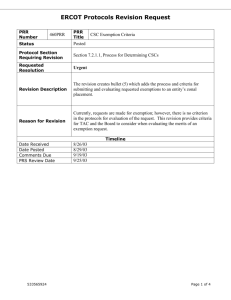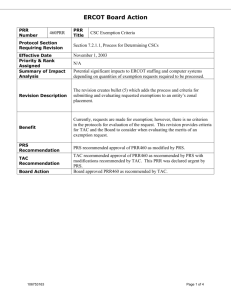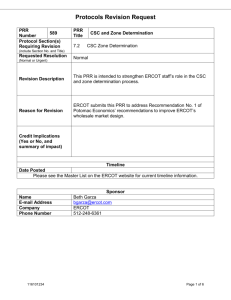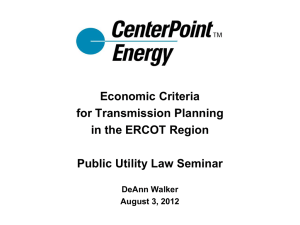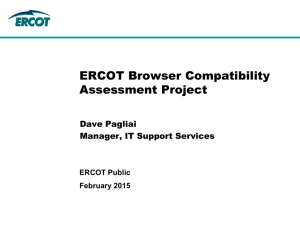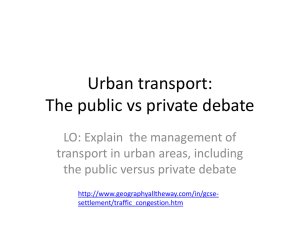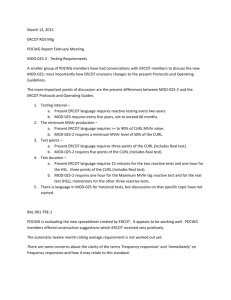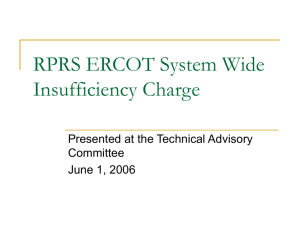Maximum Credit Limit Per Entity
advertisement
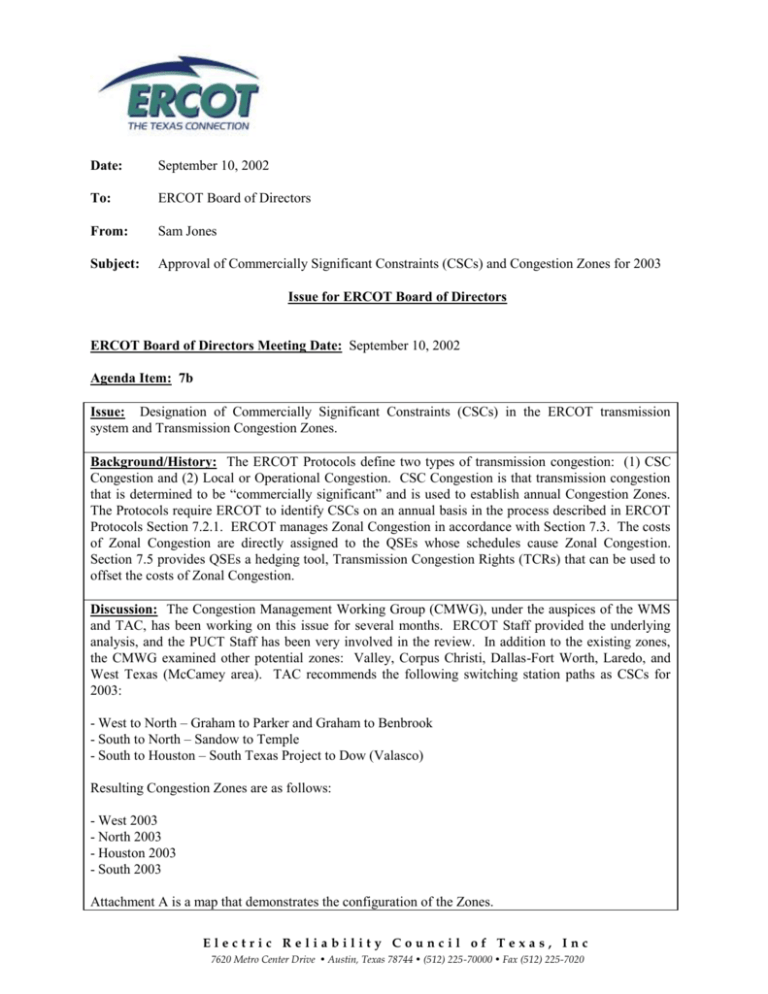
Date: September 10, 2002 To: ERCOT Board of Directors From: Sam Jones Subject: Approval of Commercially Significant Constraints (CSCs) and Congestion Zones for 2003 Issue for ERCOT Board of Directors ERCOT Board of Directors Meeting Date: September 10, 2002 Agenda Item: 7b Issue: Designation of Commercially Significant Constraints (CSCs) in the ERCOT transmission system and Transmission Congestion Zones. Background/History: The ERCOT Protocols define two types of transmission congestion: (1) CSC Congestion and (2) Local or Operational Congestion. CSC Congestion is that transmission congestion that is determined to be “commercially significant” and is used to establish annual Congestion Zones. The Protocols require ERCOT to identify CSCs on an annual basis in the process described in ERCOT Protocols Section 7.2.1. ERCOT manages Zonal Congestion in accordance with Section 7.3. The costs of Zonal Congestion are directly assigned to the QSEs whose schedules cause Zonal Congestion. Section 7.5 provides QSEs a hedging tool, Transmission Congestion Rights (TCRs) that can be used to offset the costs of Zonal Congestion. Discussion: The Congestion Management Working Group (CMWG), under the auspices of the WMS and TAC, has been working on this issue for several months. ERCOT Staff provided the underlying analysis, and the PUCT Staff has been very involved in the review. In addition to the existing zones, the CMWG examined other potential zones: Valley, Corpus Christi, Dallas-Fort Worth, Laredo, and West Texas (McCamey area). TAC recommends the following switching station paths as CSCs for 2003: - West to North – Graham to Parker and Graham to Benbrook - South to North – Sandow to Temple - South to Houston – South Texas Project to Dow (Valasco) Resulting Congestion Zones are as follows: - West 2003 - North 2003 - Houston 2003 - South 2003 Attachment A is a map that demonstrates the configuration of the Zones. Electric Reliability Council of Texas, Inc 7620 Metro Center Drive • Austin, Texas 78744 • (512) 225-70000 • Fax (512) 225-7020 These recommendations are very similar to the 2002 CSCs and Zones with the exception that there is no longer a recommended North to West CSC. The constraint on that path was no longer considered commercially significant. In addition, due to a reconfiguration by Oncor of some transmission facilities, the North/West Zone boundary shifted slightly eastward. Only two small generating units are affected (changed zones from the North to the West) and the owner has expressed no objections. The WMS and TAC also approved the following regarding the 2003 CSC and Zone designations: • STEC should continue to receive a variance for the 3 buses similar to last year (moving them from the Houston Zone to the South Zone). • A better congestion management tool should be developed for ERCOT to instruct multiple units in a timely manner. • The CMWG will begin meeting after the PUCT Workshop on Congestion Issues and review local congestion problems in the McCamey Area. The goal will be to develop recommendations for mechanisms to control the cost, and socialization of these costs, with emphasis on Market based solutions. The CMWG will present its recommendation at the December WMS Meeting ERCOT Staff will begin performing the analysis to determine the availability and number of TCRs for each CSC. ERCOT Staff and CMWG will continue analysis to determine if there are any Closely Related Elements (CREs) that may be implicated when system conditions shift CSC paths (See Protocols Section 7.2.1.3). Key Factors Influencing Issue: Determination of CSCs and Congestion Zones is based both on a technical evaluation of limits in the system and a market evaluation of whether those limits have a commercial impact. CMWG, WMS, TAC, ERCOT Staff, and PUCT Staff have devoted significant effort in reaching the recommendation in Attachment A. Alternatives: (1) Approve TAC’s recommendation regarding CSCs and Congestion Zones as presented above and in Attachment A; or (2) Reject TAC’s recommendation and remand to TAC with instructions. Conclusion/Recommendation: TAC and ERCOT Staff recommend that the Board approve the CSC and Congestions Zones recommended TAC.
